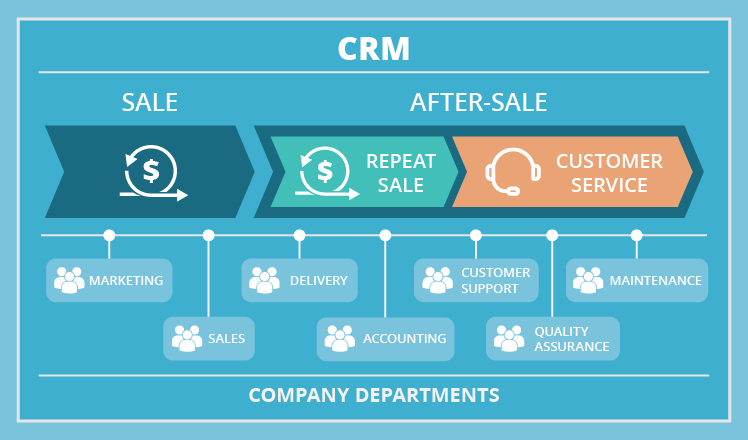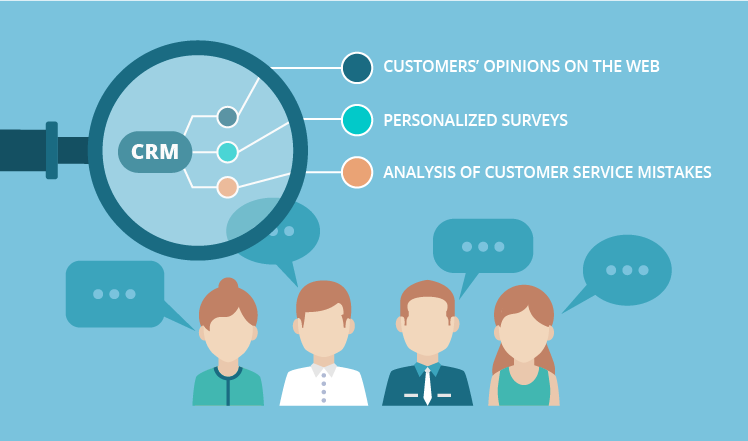A practical guide to CRM as a customer experience platform
For the last few decades, we’ve witnessed how Customer Relationship Management (CRM) struggled to evolve into Customer Experience Management (CXM), though there were more idle talks than actual practice. What I describe below is a conceptual overview of this transformation-to-be as seen through a technological lens, where the theoretical stances we’ve seen elsewhere on business blogs are translated into relevant functions of a CRM tool.
After-sale CRM, or God in the details
A sales cycle cannot be over once the first deal is closed. This is exactly the moment when the personnel behind the touchpoints that is capable of affecting customer experience (product/service quality itself, delivery, accounting, customer support, maintenance, etc.) should come together in their united efforts to sustain superb customer service experience. Even if their only remuneration can be a customer’s smile, this will still have far-reaching consequences of raising customers’ trust, loyalty and satisfaction.
However, it takes a very particular mindset of the staff members involved. Here, it’s god in the details, when even a little surprise perk (a how-do-you-do email, a limited-edition gift or an unexpected after-sales service discount) may ensure milder relationships and long-term cooperation. But it’s not only unexpected little things that please but also the ones that are differentiated and personalized for each customer. This is to provoke their emotional response to a brand through a series of activities that don’t directly target sales but contribute to the overall customer satisfaction and raise the probability of repeat purchases and referrals. Called the ‘soft factors’ of customer service by Klaus Kobjoll of Schindlerhof Hotel, cordiality, timeliness and helpfulness can add the competitive edge to a business, substituting typical expensive tropes to lure customers into buying more.
“Forge emotional connections with customers by giving them unexpected discounts and perks”
– Ernan Roman at Ernan Roman Direct Marketing
But now, the question: do you use your CRM to enhance customer experience? It’s not accidental that CRM systems are recognized as being “one of the most influential customer service tools businesses can use” (Hunter Swift, Director of Sales Development at DealerSocket). In this incarnation, a CRM can be effectively used for long-term customer experience improvement. This approach includes extending your custom CRM to cover all the stages – a sale, after-sale customer service and repeated nurturing up to a new sale. To illustrate the point, here’s the graph:

Now, we’ll outline the two crucial parts of this journey to transform CRM into a customer experience platform that should bring together not only sales and marketing but also every customer touchpoint across departments.
Discover what customers think
This spring wave of Microsoft Dynamics CRM 2016 was announced to feature ‘intelligent social’ – machine learning mechanisms for sentiment analysis. But even without it, your salespeople can discover what customers think and feel about their experience with your company – all with a little help from your CRM friend, as B2B CRM benefits cover this area as well.
First, it should become a necessary practice in account management to follow and listen to customer sentiments on an ongoing basis, then register the findings in respective customers’ CRM profiles. The logical first step is to launch a pan-organizational practice of cataloging customer data in detail and regularly (though it’s a pretty basic level of any CRM, it can be easily ruined by CRM users’ lack of discipline and inconsistency of teamwork). Sounds like a no-brainer, but actually this is what often gets overlooked by ‘carpe diem’ businesses, as I call them, that don’t care if their customers will buy again.
Second, apart from monitoring your clients’ opinions on the web, it doesn’t hurt to ask them about their experience directly through personalized surveys or a quick chat with your sales rep or account manager. We’ll elaborate on such satisfaction reviews in one of the upcoming posts, so stay tuned.
And lastly, a preventive approach. The CRM is also the tool to store the crucial information about all the rights and wrongs of your customer service that can be sourced by analyzing the repeated mishaps and mistakes made while serving customers. The wrong invoice sent, an overdue delivery or a missed follow-up, every detail should be reflected in the CRM to be then studied by means of CRM data analytics.

Influence how customers engage
It takes complete visibility into customers’ engagement and lifetime value (LTV) to know how and at what price you could develop your relationship further.
Now, down to the tips and tricks.
Tailor your communication: according to the SAP research, 47% of customers want a more personalized sales approach. Your CRM will suggest whom, what and when to send in order to trigger a necessary response that will be then entered into the system too (of course).
Apologizing for poor service is a special case of personalized communication. Whatever and whenever happens, a CRM will be the tool to automatically notify responsible people of the issues and suggest the methods to compliment the affected customer, whether it is a call to say sorry, a one-time special offer or a meet-up with the participation of senior managers.
Re-engage customers after sales: our CRM consulting practice has shown that, indeed, exceptional service creates customers for life. As a single viewpoint of customer data for all the involved departments, your CRM will supply the required information to provide a consistent, positive customer experience across channels. Plus, it comes as irreplaceable in post-sale nurturing by helping to adjust account managers’ activities to the uniformed re-engagement strategy at specified intervals.
Reward your loyal bunch: you should make it part of your business development strategy to identify and repeatedly encourage your key accounts, whether with special offers or discounts. Such key accounts can include your longest and most loyal customers who generate proportionally bigger revenues or profit than others, and it is your CRM that can identify, group and display such information in a matter of seconds.
What to introduce to your CRM system?
- complete, single-UI customer profiles that rest on master data management to keep track of the available information in the same data silo
- a custom CRM workflow to enforce a policy of ‘excusatory’ customer service, equipped with automatic notifications and updateable statuses seen to everyone involved
- unanimous user adoption, including all customer-facing departments (from deliveries to accounting) to achieve homogeneous customer service experience
- the mobile CRM version to enhance the speed and helpfulness of customer service
Make it part of your culture
As a technological extension and enabler of your customer policies, CRM is a truly powerful tool, but it is here to support, not to invent your customer experience practices. that should have already been in place at your company. As put by Bruce Temkin, Founder at Temkin Group, “customer experience is a reflection of your [corporate] culture.”
To achieve a homogenous, sustainably good CX across business units, departments and teams, your employees should unite in collaboration with the single CRM tool at its core. It’s also important that they are guided by the principles of diligence and integrity to keep customer data up-to-date, non-duplicated and coherent.
Once implemented, this disciplined approach will become a true testament to the maturity of customer experience management at your company, where CRM is used to its full potential to measure and influence the way customers think and engage with your brand.
Follow us on Facebook to get alerted to the next post to come, where we’ll define the implementation framework for transforming CRM into customer experience management.

